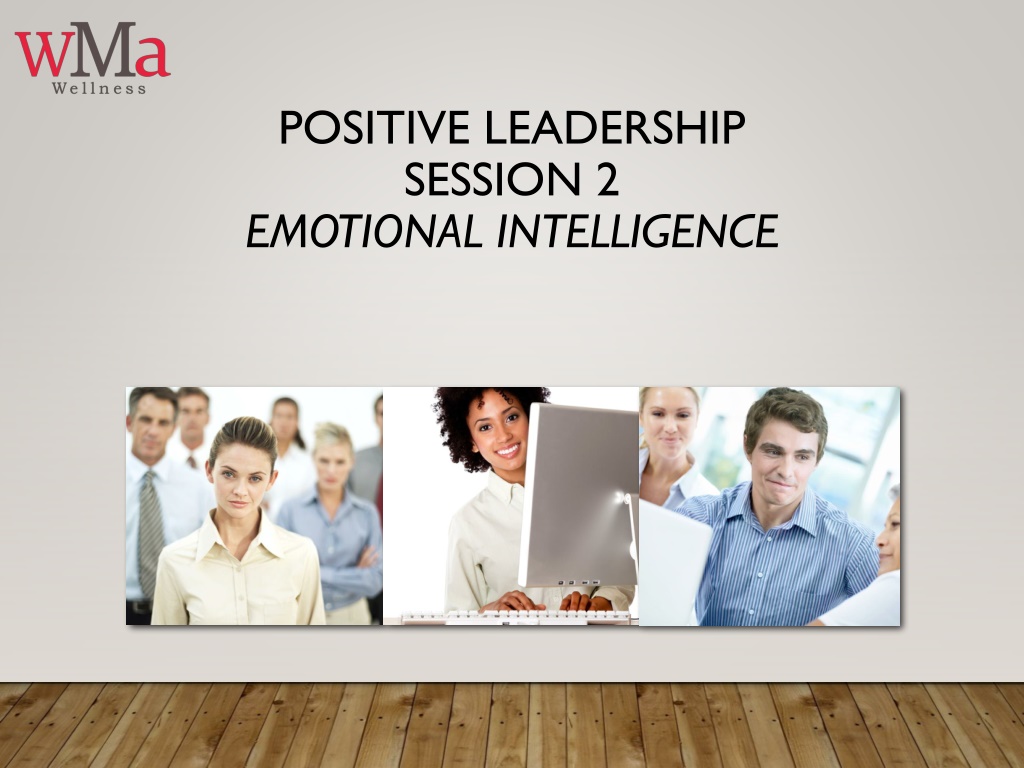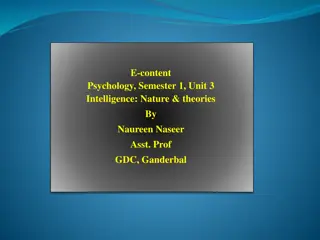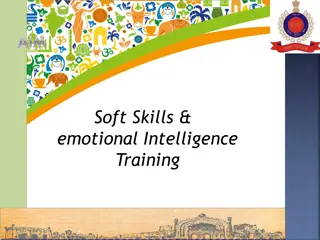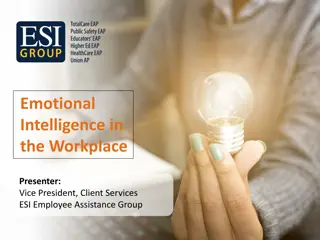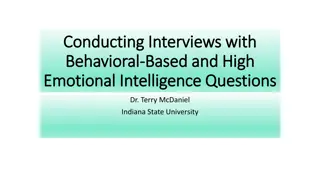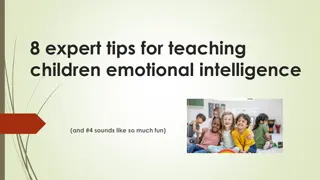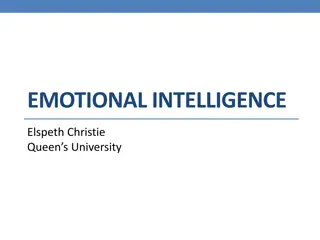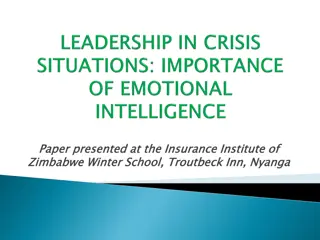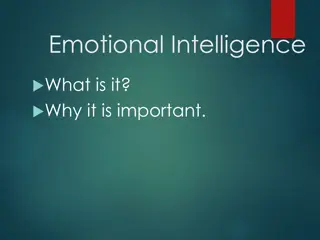Understanding Emotional Intelligence in Positive Leadership Sessions
Emotional intelligence plays a crucial role in building a positive workplace environment. Defined as the capacity to recognize, understand, and manage emotions effectively, it helps in fostering strong relationships, enhancing team dynamics, and boosting overall work performance. Emotional intelligence is linked to positive mental health, stress management, and improved coping abilities, making it an essential skill for navigating interpersonal relationships and problem-solving in the workplace.
- Emotional Intelligence
- Positive Leadership
- Workplace Environment
- Relationship Building
- Stress Management
Download Presentation

Please find below an Image/Link to download the presentation.
The content on the website is provided AS IS for your information and personal use only. It may not be sold, licensed, or shared on other websites without obtaining consent from the author. Download presentation by click this link. If you encounter any issues during the download, it is possible that the publisher has removed the file from their server.
E N D
Presentation Transcript
POSITIVE LEADERSHIP SESSION 2 EMOTIONAL INTELLIGENCE
LEARNING OBJECTIVES To gain an understanding of Emotional Intelligence and its benefits for building a positive workplace environment To become acquainted with core competences of Emotional Intelligence To examine ways I which we can enhance our own capacity to manage emotions and build positive relationships with others
WHAT IS EMOTIONAL INTELLIGENCE? In the early 1990 s, psychologists Peter Salovey and Jack Mayer were the first to theorize that people vary in terms of their capacities to perceive, understand, and use their emotions. They named this capacity emotional intelligence.
EMOTIONAL INTELLIGENCE IN THE WORKPLACE The concept of applying emotional intelligence in the workplace was conceptualized by Daniel Goleman in his books Emotional Intelligence and Working with Emotional Intelligence. Goleman was interested in understanding the EI competencies that link with enhanced work performance. (McDermont, 2008)
EMOTIONAL INTELLIGENCE DEFINED Emotional intelligence is defined as the capacity to: Recognize and manage our own emotions and to respond effectively to those of others Understand why people feel the things they do Express emotion in a way productive to the conversation Apply our knowledge of emotions (self and others) as a motivation tool and a guide to building relationships
BENEFITS OF HIGH EMOTIONAL INTELLIGENCE Emotional Intelligence allows us to recognize our emotions, and to understand the way we express them and how they affect others. With high emotional intelligence, we are aware of our feelings, and how to regulate them when dealing with others. Our understanding of people s emotions increases our capacity to build strong relationships and teams (Shults, 2015)
Benefits of High Emotional Intelligence Emotional Intelligence has been linked with positive mental health and inversely correlated with stress and emotional distress. Research suggests a positive relationship between Emotional Intelligence and coping capacities. Such outcomes suggest that having the ability to understand and manage emotions may be an important consideration in problem-solving difficult situations, especially those involving interpersonal relationships.
EMOTIONAL INTELLIGENCE COMPETENCIES Goleman identifies 5 competencies or skill areas related to Emotional Intelligence The first three components are self-management skills. The last two concern a person s ability to effectively manage relationships with others.
Emotional Intelligence Competencies Self-awareness knowing one s strengths, challenges, drives, values, and impact on others Self-regulation controlling or redirecting disruptive impulses and moods Motivation pursuing achievement with unusual internal energy and determination Empathy having sensitivity to and expressing understanding of people s perspectives and emotions Social Influence (social skill) building rapport with, engaging and inspiring others We can strengthen these abilities through persistence, practice, and feedback from colleagues or coaches.
EI SKILLS: SELF AWARENESS Self Awareness - Knowing one s strengths, challenges, drives, values, and impact on others. Core Skills -A self-aware person: Is aware of strengths Is confident about abilities Recognizes needed areas for personal growth or Seeks construct feedback from others Example:A manager recognizes that he or she does not always allot enough time to complete larger projects and has experienced rushed and stressed project work periods. Proactive efforts are undertaken prior to planning each project step, setting aside realistic time periods for the completion of tasks.
EI SKILLS: SELF REGULATION Self Regulation - Controlling or redirecting disruptive impulses and moods Core skills Self Regulation involves: Managing emotions in difficult situations Taking time to reflect before responding Being comfortable with ambiguity and change Redirecting personal emotions in positive ways Example:When a team presentation does not go well, the manager who is initially upset with the situation takes a few minutes apart from the team to reflect and collect her feelings. Next, she considers with her team explanations for the unsuccessful presentation and strategies for enhancing subsequent presentations. In this case, emotional energy is managed and redirected toward solution building with the team .
EI SKILLS: MOTIVATION Motivation - Pursuing achievement with unusual internal energy and determination Core Skills -A motivated leader: Exhibits passion for work Enjoys taking on new challenges Demonstrates sustained energy to develop or self-improve Maintains optimism in the face of challenges Example: A manager experiences the loss of some crucial contracts. In lieu of blaming this situation of external circumstances, he decides to learn from the experience and collaborates with his team to develop plans to turn things around. He remains positive and optimistic about the future in spite of recent challenges.
EI SKILLS: EMPATHY Empathy - Having sensitivity to and expressing understanding of people s perspectives and emotions Core skills People with empathy: Are sensitive to the feelings of people Listen actively Consider the feelings of others when decisions are made Are committed to developing team members Example: A manager meets with a new client to explore potential contracts. The client is quiet and reflective, and team members interpret this as lack of interest in potential contract options. The manager observes the nonverbal behaviour of the client and senses a level of interest. The manager continues the meeting, inviting the client to ask questions and to verbalize areas of interest .
EI SKILLS: SOCIAL INFLUENCE Social Influence - Building rapport with, engaging and inspiring others Core skills Social Influence involves: Enjoying networking with others Establishing rapport easily with other Inspiring or motivates team members Building a sense of team Example: A manager envisions new market options for a new product. She connects with other personnel within her division and effectively sells the idea of this new product line. A team is assembled to make this idea a reality for the company. Team members are excited and energized about this innovation!
APPLICATIONACTIVITY Examining EI Strengths and Areas for Development Complete the Emotional Intelligence Skills Inventory and follow the instructions to achieve a score for each of the EI competency areas. Consider the following questions: What specific EI competencies are the highest? How do I currently use these competencies in my workplace? What EI scores are lower? How might I further develop these competencies? Following the inventory, there is a list of strategies for developing each of the EI competences. Consider applying some of these strategies as you continue to develop your EI capacity.
Strategies for Increasing Self Awareness Monitor your feelings of wellbeing Ask yourself, How do I feel today? Begin by rating your overall sense of wellbeing on a scale of 0 to100, and write the scores down in a daily log book. If your feelings seem extreme one day, take a minute or two to think about any ideas or associations that seem to be connected with the feeling. Put feelings and thoughts in perspective When you experience stressful emotions, it may be beneficial to ask What do I think about that? Our emotions often reflect our thoughts or beliefs about specific situations. Jumping to conclusions or making generalizations about situations without sufficient information can increase our feelings of stress or concern. Asking others for feedback regarding our thoughts or beliefs about a situation may be helpful for putting our thoughts in perspective, and for reducing feelings of stress or concern.
Strategies for Increasing Self Awareness Recognize your daily strengths Create a list of all the activities you complete over the course of a given day in the home, community or workplace setting. What strengths are used to complete these tasks? List these strengths beside each of the activities. Look for patterns of strength that are reflected in your daily activities
Strategies for Increasing Self Regulation Identify emotional triggers An important part of being self-regulated is recognizing our emotional triggers and what situations or events are particularly stressful. For example, feeling overloaded at work or having back-to-back meetings may set us up for experiencing more stressful emotions. When we are aware of such triggers, we can take positive action such as spreading the times of our meeting out or breaking what seem to be overwhelming tasks into smaller chunks or steps.
Strategies for Increasing Self Regulation Focus on Finding the Positive Another strategy is to focus on finding something positive in a stressful situation. This small shift in perspective can transform our thinking and make us feel more optimistic about the future. Apply Calming Strategies Relaxation techniques such as deep breathing can calm us during stressful events. They help interrupt negative thoughts and help us to move forward in a calm and more positive way. Breathe in slowly for five seconds and then breathe out for five. Focus on your breathing, and repeat this at least five times.
Strategies for Increasing Motivation Understand what motivates you It is essential to understand what motivates you because this is the driving force that moves you toward your goals. Think about the times you were most energized or passionate about your work. What was happening? Make a list of the specific things or activities that were most motivating for you and that increased your energy. Learn new skills from others Enhance your skills by working with a mentor or by having someone coach you on a new task or competency. A mentor can offer new insights and perspectives on enhancing skills and setting directions for further growth or development.
Strategies for Increasing Motivation Be solution focused When faced with challenges or obstacles, take a solution-focused approach. Decide upon the next steps for moving forward in lieu of redefining problems or assigning blame for current challenges.
Strategies for Increasing Empathy Demonstrate sincere interest Demonstrate that you have a sincere interest in people and that you want to know about the things that are important to them. Ask them questions about their hobbies, their families, and their aspirations. Be sensitive to nonverbal cues Listen carefully to hear and observe the emotions that people are communicating when they speak to you.. Be attentive to their tone of voice, pace of speech, facial expressions and gestures. Emotion expressed nonverbally may communicate even more than the words that people use.
Strategies for Increasing Empathy Listen Actively Take a colleague for coffee and practice being an active listener. Demonstrate key skills for active listening, such as focusing, asking open- ended questions, and paraphrasing what is heard. When something is not understood, active listeners ask for clarification.
Strategies for Increasing Social Influence Access professional forums Being part of professional associations and having a presence on appropriate online forums assists in the development of meaningful contacts related to work and professional development activities. Contacts made through these venues may provide important networking opportunities. Inspire a unified team vision When leaders demonstrate passion and energy about the organization, its goals and the work itself, they motivate others on their teams to do the same. Similarly, when leaders create a clear picture of future goals, team members can be engaged in conversations about the relevance of their roles in fulfilling such a vision.
Strategies for Increasing Social Influence Build a sense of team Carrying out team-building activities with members of the workplace community is critical for fostering mutual understanding of personal preferences, and for appreciating individual differences. Such activities contribute to the cohesion of the team and to greater ease in working as a collective.
